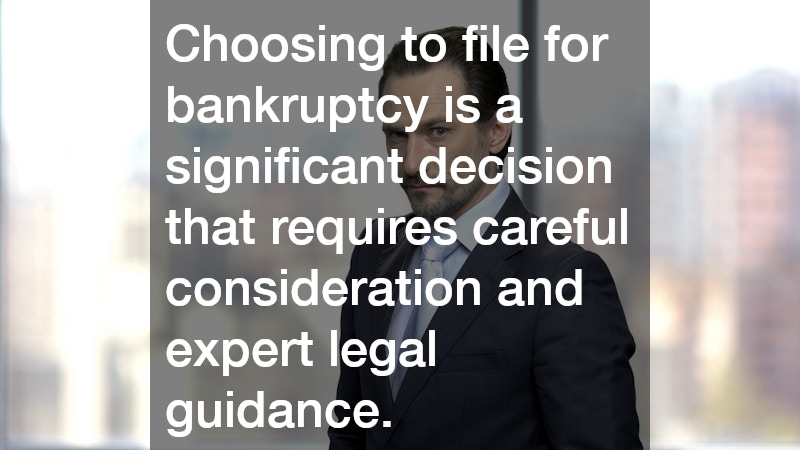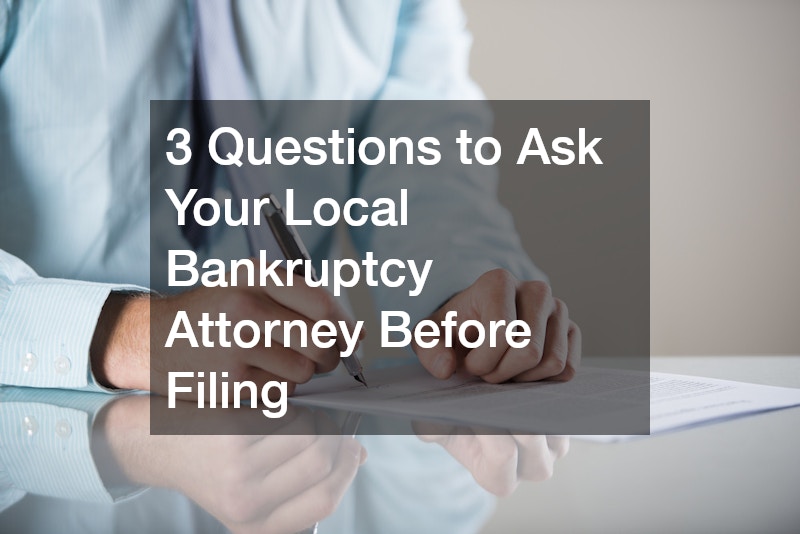Filing for bankruptcy can be a daunting process, and it’s essential to have the right guidance before making such a critical decision. A local bankruptcy attorney can provide invaluable assistance, but how do you choose the right one? Here are three fundamental questions to ask your potential bankruptcy attorney to ensure you’re in good hands.
What Type of Bankruptcy Is Right for Me?
Understanding Chapter 7 vs. Chapter 13
Chapter 7 bankruptcy, often referred to as “liquidation bankruptcy,” involves the sale of a debtor’s non-exempt assets to pay off creditors. In contrast, Chapter 13 bankruptcy, known as the “wage earner’s plan,” allows debtors to keep their property and pay back debts over time, usually three to five years.
It is crucial to understand the eligibility requirements for each type, as Chapter 7 may not be available if your income is too high compared to the state median. On the other hand, Chapter 13 is often chosen by individuals with a regular income who can manage a repayment plan, but it requires commitment to restructure finances long-term.
Discussing these options with a qualified local bankruptcy attorney can help determine which path is aligned with your financial and personal situation. Their expertise can provide clarity on the advantages and limitations of each bankruptcy type.
Specific Situations and Their Impact
Every individual’s financial situation is unique, and factors such as the amount and type of debt can significantly impact the type of bankruptcy that is appropriate. For instance, significant unsecured debts like credit card balances may make Chapter 7 more attractive, while secured debts might be better managed under Chapter 13.
Personal assets, such as a home or car, and their associated equity can also influence the bankruptcy decision. Chapter 13 allows individuals to retain these assets while creating a feasible repayment plan, avoiding assets’ liquidation required under Chapter 7.
What Are the Potential Consequences of Filing for Bankruptcy?
Impact on Credit Score
Filing for bankruptcy can have a significant negative impact on your credit score, often lowering it by 200 points or more initially. However, over time, individuals can rebuild their credit score by responsibly managing their finances post-bankruptcy.
Understanding that bankruptcy will remain on your credit report for seven to ten years, depending on the type, can help frame expectations for financial recovery. With effective credit management and secured credit rebuilding strategies, improvements can be seen well before the bankruptcy is removed from your record.
Discussing strategies for credit recovery with your attorney can help mitigate the long-term effects. They may advise on credit-building tools such as secured credit cards or credit-builder loans, which can be instrumental in the rebuilding process.
Effects on Personal and Financial Life
Beyond the impact on your credit score, bankruptcy can bring several other changes to your personal and financial life. For example, it may affect your ability to secure loans or credit in the future, requiring higher interest rates or secured deposits.
In addition, filing for bankruptcy could influence your job prospects, particularly if you’re seeking positions in finance or are applying to small companies where sole proprietors might screen applicants’ credit history. Employers sometimes view a history of bankruptcy as indicative of personal financial responsibility.
What Costs Are Involved in the Bankruptcy Process?
Attorney Fees and Court Costs
Understanding the costs associated with filing for bankruptcy is crucial, as this decision involves not only emotional but also financial investment. Attorney fees can vary significantly based on location, complexity of the case, and the type of bankruptcy filed.
In addition to attorney fees, debtors should account for court costs and associated expenses, which can include filing fees that must be paid to the court upon filing their bankruptcy petition. It is essential to receive a clear breakdown of these costs to prepare adequately and avoid unforeseen expenses.
Having a transparent conversation with your attorney regarding fees can prevent misunderstandings down the line. This discussion can include payment plans or upfront fee arrangements to ensure affordability and efficacy in legal representation.
Hidden Fees and Additional Expenses
Aside from the visible costs, individuals considering bankruptcy should be aware of potential hidden fees or additional expenses. These can include costs for mandatory credit counseling courses required before filing for bankruptcy.
Other expenses might arise from postage, document preparation, or transportation costs associated with mandatory court appearances. Being aware of these can help you budget more effectively for the entire bankruptcy process.
By discussing these potential hidden costs with a bankruptcy attorney, you can receive comprehensive guidance about what to anticipate financially. Attorneys can provide strategies to minimize these costs where possible, ensuring the process remains as financially viable as possible.
Choosing to file for bankruptcy is a significant decision that requires careful consideration and expert legal guidance. By asking your local bankruptcy attorney these critical questions, you can gain clarity about your specific situation and ensure you’re making the best decision for your financial future.


